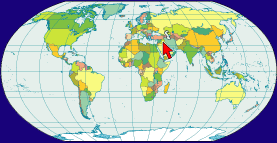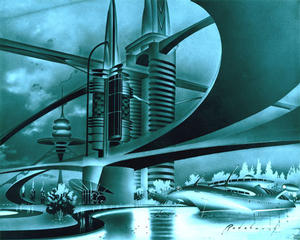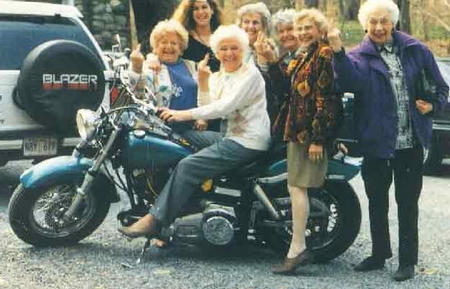| Wednesday, March 5, 2003 |  |
|
|
|
Britt Blaser posts some well-balanced thoughts about empowered dialogue in regards to war or no war."In the fall of 1967, I was flying C-130s in Viet Nam and my fiancée was marching for peace in Washington. We didn't see that as a conflict—more like covering both sides of the story. Nor did we feel any tension around this. I was there because I was expected to be there, and, having been born in 1942, I had grown up with the expectation of military service. She marched because our generation was working out a new voice and that view had to be sent to the politicians." Indeed, it is not as simple as a for or against, and that everybody is just one or the other. It is vital to examine all sides. Preferably to step into the shoes of all sides. Personally I'm not even particularly a pacifist, in the sense of refusing all uses of violence. Sometimes it is the best solution to kill people. If you threaten me and my family enough with physical harm, and I don't see any other solution, I'd kill you too. But violence and death is a very real and serious matter. The people you kill will be dead. The people you didn't quite succeed in killing, or that were just accidentally standing too close to the action, they will be messed up. They'll have missing body parts, and they'll have lost people they loved. Their husbands and wives and children and parents. It is very ugly. It isn't just something you can decide remotely, to make a political statement. Anyway, Britt is somebody who's experienced war first hand, who's been shot at, shot down in a plane, who's pals have been killed, so I certainly pay attention to his angles on this. Anyway, one of the main points Britt is making here, which could lead to uncomfortable conclusions is along the lines of:"If we don't occupy Iraq now, the body count goes up—not because that's where the terrorists are, but because we will not have been forceful enough to do so and silence the Arab machismo affect." The idea being that there are terrorists out there. They'll kill people if they can get away with it. But it is more like a street fight than a war. But that it is necessary to send a signal of strength, or the other parties will exploit our weakness. Hm, I can see that, but at the same time I don't agree. I think that the people we're dealing with, in the Middle East, and the groups we're concerned with as sources of terrorism, I think they certainly respect strength. They might be likely to respect displays of power more than they respect talk. But at the same time they feel morally obliged to revenge and pay back injustices believed to be carried out against their people, whatever definition they have of what 'their' people are, or of what injustices are. I think that's the motivation. It isn't just because they can, and nobody's stopping them. Violence that in any way can be regarded as unjust will tend to foster more payback violence, in the form of terrorism. But strength itself doesn't necessarily create that backlash. I think the Arab machismo is a big factor, but I think the worst you can do about it is to humble it. The trick is to display unarguable strength, but not to force your opponents to lose face. If you do, they will be morally obliged to use their very last breath to try to regain their pride.
The whole thing has been handled badly in terms of diplomacy from the U.S. side. It is set up so that Bush, and his pal Blair, would lose face if they don't get their war. Because they've spent a lot of energy on talking about how they're going to bomb Iraq no matter what. So, of course, if they're forced to back down, it looks a bit stupid, and they look weak. They've played their cards very badly diplomatically. It could very well have been a useful thing to send all those soldiers and all that hardware down there to stand and look very threatening. It could have been done in a way where it would have been a victory if war didn't become necessary. Right now it would look like a loss of face, even if Hussein spontaneously disappeared altogether.
I don't think the lack of a war now would in any way increase the likelyhood of something worse happening later. On the contrary. What makes this war almost inavoidable is only the unwillingness of the side of the current U.S. administration to look weak, or to be caught being wrong. It is about proving that one is right by proceeding with the original plan, even though it was greatly bungled.
[ Politics | 2003-03-05 13:51 | | PermaLink ] More >
|
|
|
|
 According to the National Geographic Roper Geographic Survey, 87% of Americans can't find the country of Iraq on a map. That was a bit disturbing, since many of those support going to war against Iraq. Anyway, go find Iraq on a map, so you don't have to be part of those 87%. Americans ranked second to last in the international survey. 11% of the people surveyed couldn't even find their own country on a map. According to the National Geographic Roper Geographic Survey, 87% of Americans can't find the country of Iraq on a map. That was a bit disturbing, since many of those support going to war against Iraq. Anyway, go find Iraq on a map, so you don't have to be part of those 87%. Americans ranked second to last in the international survey. 11% of the people surveyed couldn't even find their own country on a map.
[ Information | 2003-03-05 14:10 | | PermaLink ] More >
|
|
|
|
It is a good idea not to forget how the last gulf war was started. Yes, Iraq invaded Kuwait, but I think a lot of people are not aware that the United States quite directly and officially had let Saddam Hussein know that he was welcome to have his way with Kuwait. In other words, it was a trap. Read more about it, and read the transcript of what the U.S. ambassador actually said.Eight days before the outbreak of the Gulf war, Saddam summoned April Glaspie, then the American ambassador to Iraq, and launched into a tirade. He railed about the pernicious role of the British in the region, reminded her that without Iraq the Iranians would not be stopped from taking over the whole region by anything short of nuclear weapons, and complained about the "economic aggression" of Kuwait and the United Arab Emirates in agitating for lower oil prices. He made it all too clear that he intended to use force to stop what he claimed were Kuwaiti incursions onto Iraqi territory in the so-called Neutral Zone. Glaspie replied that the Americans, too, had experience with "the colonialists," which indeed seems odd given that the US and these very "colonialists" would be jointly bombing the hell out of Iraq is a little over a week's time. As for the price of oil, Ms. Glaspie opined that "We have many Americans who would like to see the price go above $25 because they come from oil-producing states." At a time when the US secretary of state was none other than James Baker, a Texan who virtually personifies Big Oil, the implications of what the US Ambassador was telling Saddam were inescapable. Glaspie went on to say:
"I think I understand this. I have lived here for years. I admire your extraordinary efforts to rebuild your country. I know you need funds. We understand that and our opinion is that you should have the opportunity to rebuild your country. But we have no opinion on the Arab-Arab conflicts, like your border disagreement with Kuwait. I was in the American Embassy in Kuwait during the late 60's. The instruction we had during this period was that we should express no opinion on this issue and that the issue is not associated with America. James Baker has directed our official spokesmen to emphasize this instruction. We hope you can solve this problem using any suitable methods . . ."
[ Politics | 2003-03-05 15:16 | | PermaLink ] More >
|
|
|
|
 Fun exhibit entitled "Radebaugh - The Future We Were Promised" in Philadelphia. Article here. A.C. Radebaugh was a commercial illustrator whose works in the 30s, 40s and 50s painted a vision of a glorious tomorrow. Optimistic visions of flying cars and colonies on Mars. All the fun technology and the leisurely lifestyle we really *should* have had by now. Where is the future we were promised? Radebaugh's art is no less enjoyable today. Fun exhibit entitled "Radebaugh - The Future We Were Promised" in Philadelphia. Article here. A.C. Radebaugh was a commercial illustrator whose works in the 30s, 40s and 50s painted a vision of a glorious tomorrow. Optimistic visions of flying cars and colonies on Mars. All the fun technology and the leisurely lifestyle we really *should* have had by now. Where is the future we were promised? Radebaugh's art is no less enjoyable today.
[ Inspiration | 2003-03-05 23:59 | | PermaLink ] More >
|
|
|
|
Dean Kamen, inventor of the Segway scooter, and many other interesting things, introduced last Thursday a portable water purifier that he hopes will save millions of people around the world from shortages of fresh water. It is a 100 pound device which requires little maintenance and uses no chemicals or filters. It uses a specialized distillation and condensation process and produces 10 gallons of clean water an hour on 500 watts of electricity. The idea is that it goes hand in hand with a generator he's also developed, which uses a Stirling engine to produce electricity.
[ Technology | 2003-03-05 23:59 | | PermaLink ] More >
|
|
|
|
Nice article at Kuro5hin about the potential for profitable power from ocean waves. Harvesting hydro electric power from waves has been a tricky undertaking, but apparently progress is happening. Lots of details and references about the technology.
[ Nature | 2003-03-05 23:59 | | PermaLink ] More >
|
|
|
|

"You can live to be a hundred if you give up all the things that make you want to live to be a hundred." --Woody Allen
[ Inspiration | 2003-03-05 23:59 | | PermaLink ] More >
|
|
 According to the National Geographic Roper Geographic Survey, 87% of Americans can't find the country of Iraq on a map. That was a bit disturbing, since many of those support going to war against Iraq. Anyway, go find Iraq on a map, so you don't have to be part of those 87%. Americans ranked second to last in the international survey. 11% of the people surveyed couldn't even find their own country on a map.
According to the National Geographic Roper Geographic Survey, 87% of Americans can't find the country of Iraq on a map. That was a bit disturbing, since many of those support going to war against Iraq. Anyway, go find Iraq on a map, so you don't have to be part of those 87%. Americans ranked second to last in the international survey. 11% of the people surveyed couldn't even find their own country on a map.  Fun exhibit entitled "Radebaugh - The Future We Were Promised" in Philadelphia. Article here. A.C. Radebaugh was a commercial illustrator whose works in the 30s, 40s and 50s painted a vision of a glorious tomorrow. Optimistic visions of flying cars and colonies on Mars. All the fun technology and the leisurely lifestyle we really *should* have had by now. Where is the future we were promised? Radebaugh's art is no less enjoyable today.
Fun exhibit entitled "Radebaugh - The Future We Were Promised" in Philadelphia. Article here. A.C. Radebaugh was a commercial illustrator whose works in the 30s, 40s and 50s painted a vision of a glorious tomorrow. Optimistic visions of flying cars and colonies on Mars. All the fun technology and the leisurely lifestyle we really *should* have had by now. Where is the future we were promised? Radebaugh's art is no less enjoyable today.